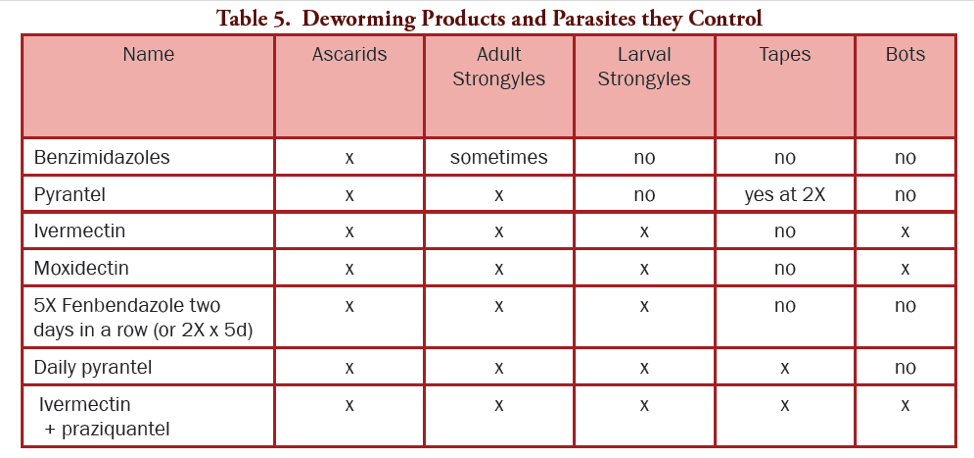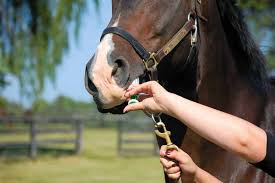Fall Deworming for Horses
go.ncsu.edu/readext?746417
en Español / em Português
El inglés es el idioma de control de esta página. En la medida en que haya algún conflicto entre la traducción al inglés y la traducción, el inglés prevalece.
Al hacer clic en el enlace de traducción se activa un servicio de traducción gratuito para convertir la página al español. Al igual que con cualquier traducción por Internet, la conversión no es sensible al contexto y puede que no traduzca el texto en su significado original. NC State Extension no garantiza la exactitud del texto traducido. Por favor, tenga en cuenta que algunas aplicaciones y/o servicios pueden no funcionar como se espera cuando se traducen.
Português
Inglês é o idioma de controle desta página. Na medida que haja algum conflito entre o texto original em Inglês e a tradução, o Inglês prevalece.
Ao clicar no link de tradução, um serviço gratuito de tradução será ativado para converter a página para o Português. Como em qualquer tradução pela internet, a conversão não é sensivel ao contexto e pode não ocorrer a tradução para o significado orginal. O serviço de Extensão da Carolina do Norte (NC State Extension) não garante a exatidão do texto traduzido. Por favor, observe que algumas funções ou serviços podem não funcionar como esperado após a tradução.
English
English is the controlling language of this page. To the extent there is any conflict between the English text and the translation, English controls.
Clicking on the translation link activates a free translation service to convert the page to Spanish. As with any Internet translation, the conversion is not context-sensitive and may not translate the text to its original meaning. NC State Extension does not guarantee the accuracy of the translated text. Please note that some applications and/or services may not function as expected when translated.
Collapse ▲What is on your fall and winter preparation list for your horse? Stockpiling hay? Establishing winter forages in your pastures? Getting blankets ready? What about deworming? Just because the temperature starts dropping, does not mean the parasites will drop off as well.
With any deworming treatment, a fecal count needs to be done first to determine parasite load and type of parasite. A fecal count is an estimate of the number of parasite eggs in a horse. Once we know the count and the type of parasite, we can treat it with the most effective dewormer to ensure we are reducing the parasite load. The important deworming season in North Carolina is September – April. During the summer months of May-August, parasite egg numbers in pastures are much lower due to the hot summer temperatures, and deworming is less of a priority.
Horses shed eggs differently, for example yearlings tend to shed small strongyles at higher amounts than adult horses. It’s important to know how heavy of a shedder your horse is. A low shedder fecal count will be <200 EPG (eggs per gram of manure). Moderate shedder fecal counts will be 200-500 EPG, and high shedder fecal counts will be <500 EPG.
Before starting any deworming regiment, consulting with your vet is important. They will recommend the best treatment course that will minimize parasite loads and avoid building a resistance to dewormers.
Low shedders (<200 EPG) can be dewormed twice a year, in the spring and fall seasons. In the spring Ivermectin (Equell®, Zimectrin®, Rotectin®, IverCare®), Moxidectin (Quest®) can be used. In the fall Ivermectin w/Praziquantel (Equimax®, Zimectrin Gold®) or Moxidectin with Praziquantel (Quest Plus®) are dewormers that can be administered.
Moderate shedders (200-500 EPG) may need to be dewormed frequently throughout the year. A spring deworming can be done using Ivermectin (Equell®, Zimectrin®, Rotectin®, IverCare, etc), moxidectin (Quest®) or double-dose Fenbendazole for 5 days (Panacur® PowerPak). In late summer, Pyrantel Pamoate (Strongid paste®, TapeCare Plus®, etc), fenbendazole (Panacur®, Safe-Guard®) can be given. In early winter, Ivermectin w/ Praziquantel (Equimax®, Zimectrin Gold®) or Moxidectin with Praziquantel (Quest Plus®) can be administered.
High shedders (>500 EPG) may need to be dewormed with every season change. In spring again Ivermectin (Equell®, Zimectrin®, Rotectin®, IverCare®), Moxidectin (Quest®) or double-dose of fenbendazole for 5 days (Panacur® PowerPak) can be given. During the summer Pyrantel Pamoate (Strongid paste®, TapeCare Plus®), Fenbendazole (Panacur, SafeGuard®) or Oxibendazole (Anthelcide®) can be used. In fall Ivermectin w/ Praziquantel (Equimax®, Zimectrin Gold®) or Moxidectin with Praziquantel (Quest Plus®) will be effective. And during the winter season Pyrantel Pamoate (Strongid paste®, TapeCare Plus®), Fenbendazole (Panacur®, SafeGuard®) or Oxibendazole (Anthelcide®) can be administered.
When it comes to pregnant mares and foals that are two months old, consulting with your vet is important for proper care so they can help determine the best treatment plan.
There are other ways to lower parasite loads in horses in combination with deworming. One being rotational grazing. Rotating pastures is not only good for forage regrowth but parasite eggs that are shed in the manure are not ingested as quickly by a host and die out. Cross grazing pastures with ruminants such as cows, goats, and sheep is also effective. Parasites that are common in equine are not found in ruminants and vice-versa. In the summer months spreading or dragging manure is beneficial both for parasite reduction and spreading of nutrients found in manure over the pasture. This also keeps nutrients buildup down in high manure concentrated areas. In winter months the removal of manure is also helpful in decreasing parasite numbers. Doing these things with a parasite control program approved by your vet can keep your horse healthy all year long.
The table below is a chart of active ingredients and the parasites they target.
The use of brand names and any mention or listing of commercial products or services in this publication does not imply endorsement by North Carolina State University nor discrimination against similar products or services not mentioned.





